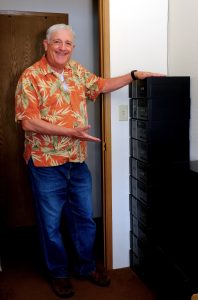By Jorge Restrepo, Ballard Rotary Club, Seattle, USA

The author with a stack of reconditioned PCs
I’m writing to offer a project that can make your club a boon for marginalized communities, low-income seniors, international service projects, non-profits, NGOs, and the environment. Here’s how Rotarians can rescue PCs and their vital materials, and empower your community with free or affordable tech.
A very large percentage of high-tech devices are thrown away after becoming obsolete, creating a huge amount of toxic e-waste. The volume is growing shockingly fast. According to the Global E-waste Statistics Partnership (GESP), an initiative of the UN and other partners, e-waste grew by 21% in the five years up to 2019, when 53.6 million metric tonnes of e-waste were generated. Last year’s e-waste weighed as much as 350 cruise ships. This growth is projected to continue as the use of computers, mobile phones and other electronics expands, along with their rapid obsolescence.
As a staunch environmentalist, I’m tackling this problem locally in Seattle by partnering with PC-reconditioning programs. My goal is to create a successful model Rotarians can implement in every city. Its mission will be to accept e-waste, re-condition devices that can be given a second life, re-coup materials (by “urban mining”) from those devices that cannot be reconditioned, and re-cycle whatever components were mined. This opens rewarding service opportunities for Rotarians from many professions, as you’ll see below.
Why should the growth of e-waste concern us?
Obsolete tech devices contain many minerals, such as copper, gold, silver, platinum, mercury, cadmium, lithium, and lead: some of these highly toxic. When e-waste is deposited into landfills, these chemicals end up leaching into soil and groundwater, poisoning the food chain and putting people and wildlife at risk.
According GESP’s 2020 Global E-Waste report, only 17.4 percent of the world’s e-waste in 2019 was documented, collected, and recycled properly—leaving more than 82 percent of it essentially unaccounted for. Within that 82 percent, the experts say, was 55 tons of mercury that have either already been released into the environment or will be eventually be released. But that e-waste also contains an estimated $57 billion worth of potentially recoverable precious metals and minerals.
Inaction about e-waste is absurdly costly. It’s turning Mother Earth into a wasteland and squandering valuable materials that we can use again.
Find local organizations to help you rescue PCs and their vital materials:
In my region, I am working with Free Geek in Portland, Oregon. Free Geek is a role model in PC reconditioning, ranking as the fifth largest in the U.S. Another local organization is Interconnection (Interconnection.org) in Seattle. Both set a high bar in terms of reducing e-waste and leading by example. They take tech equipment in general, but more specifically donated PCs and peripherals.
They clean the PCs that are working, remove and destroy the hard drives, and then install a fresh operating system. Interconnection re-installs Windows, while Free Geek installs a version of Linux (very similar to Windows), plus lots of software programs. Linux achieves relatively fast speeds. One of the significant benefits Linux offers is that it is fully licensed and FREE, whereas every installation of Windows needs to be purchased from Microsoft to be able to be licensed properly. Unlike Linux, every Windows installation literally comes bare without much additional software, making it necessary to purchase expensive software to be productive, as well as anti-virus to protect the investment.
Any devices which can’t be restored to operating condition are mined to extract useful minerals, as well as the hard drive, which is destroyed. Once the equipment is mined, it is recycled. This urban mining results in a significant reduction of pollutants and poisoning of our waters. It also reduces our dependence on foreign mines, whose operations can cause terrible environmental and humanitarian harm.
How Rotarians can benefit multiple people through this solution:
Rotarians can promote and support tech recycling, including ESRAG’s lithium-ion battery recovery project, as frequent and routine events throughout your metro area. You can make tech recycling easier and minimize e-waste by
- organizing mobile collection, with vans routinely visiting suburbs and neighborhoods
- reconditioning whatever tech devices can be given a second wind
- promoting the use of perfectly good reconditioned tech, computers, and peripherals.
- mining valuable metals (many of them poisonous), from tech devices that cannot be reused.
Benefits to the community:
Once you establish a local non-profit or set up a collaboration between your club and an existing social enterprise like FreeGeek. you can provide free or affordable tech to countless people who need it:
- Non-profits, allowing them to dedicate a larger percentage of their scarce funds to their core mission, instead of being part of the problem.
- Low-income families for their children to use in schooling.
- Refugees. You can configure their devices in foreign languages and characters.
- Seniors or senior centers, using large icons and fonts.
- Child development centers, with software designed for education.
- Third World communities our Rotary projects serve, helping them bridge the digital gap.
Share your skills to ensure success:
We call on Rotarians with some of the following areas of expertise to join your Club’s environmental committee and share these skills to build your tech recovery and recycling project: IT knowledge, non-profit corporate law, or administration. With your help, we will all mature and bring. this idea to reality.
This project is a Win-Win: a win for the environment, and a win for the community
YES… WE CAN DO BETTER!
Seattle Rotarian Jorge Restrepo is a multilingual realtor specializing in international, commercial, and business real estate, including land for solar or wind generation and cell towers. Email him for more information on this project.
